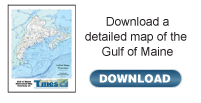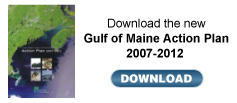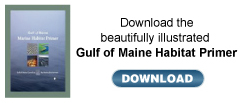Profile: Heather Leslie
Making a mission of resilience science
By Kirsten Weir
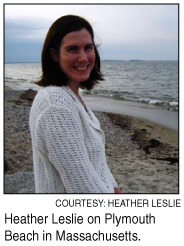 Heather Leslie is something of a split personality—in the very best way. One day you’ll find the Brown University scientist on the rocky New England coast, studying tide pool tenants like barnacles and sea stars. The next day she’ll have turned her attention to mathematical modeling and theoretical thinking as she immerses herself in the burgeoning field of resilience science. Heather Leslie is something of a split personality—in the very best way. One day you’ll find the Brown University scientist on the rocky New England coast, studying tide pool tenants like barnacles and sea stars. The next day she’ll have turned her attention to mathematical modeling and theoretical thinking as she immerses herself in the burgeoning field of resilience science.
Resilience science is the study of the ways ecosystems respond to disturbance. Can a damaged wetland absorb an ocean storm surge? Will an overfished swath of ocean collapse into a barren seascape? Finding answers to such big-picture questions can be dizzyingly complex. “The resilience work is a bit more conceptual than what a lot of people think of as ‘science,’” Leslie said. Yet as the field matures, resilience thinking is becoming an increasingly important tool for managing our fragile coasts.
Leslie grew up in Plymouth, Massachusetts, and spent much of her childhood close to the water. “That certainly sparked an early love of the ocean in me,” she said. She studied science at Harvard and earned her Ph.D. at Oregon State University, investigating how marine invertebrates respond to varying conditions up and down the Oregon coast. Last summer, she returned to her New England roots when she accepted a position as assistant professor of environmental studies and biology at Brown in Rhode Island.
Resilience doesn’t imply that an ecosystem will remain static, Leslie explained. Rather, resilient places are those that can adapt to disturbances. When winter arrives on New England’s barrier beaches, for instance, sea birds take leave, and the topography of the dunes changes as they are slammed by winter storms. “Their appearance changes through time, but the same ecosystem remains,” she said. “The functioning barrier beach is still there.”
Every ecosystem is different, of course, but Leslie pointed to certain characteristics that resilient places tend to share. Among the most important, she said, is diversity. “More species-rich ecosystems, as a rule, tend to be more resistant to disturbance—whether invasions by invasive species, or a change in environmental conditions.”
Also key, she said, is that important interactions remain intact. The delicate dances between predator and prey, for example, are crucial to a healthy environment. Even diverse ecosystems with healthy interactions can suffer, however, if the nature of the disturbance changes. Consider again the barrier beaches. If storms suddenly become more frequent or more severe as a result of climate change, Leslie noted, the once-resilient beaches may no longer be able to shoulder the blows.
Predicting whether or not an ecosystem is resilient is still a daunting task, said Leslie. But she’s optimistic. In the last several years, she said, resilience science “has moved beyond intellectual curiosity, toward actually trying to apply this knowledge to inform environmental decision making.”
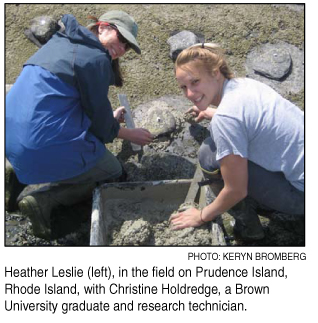 In many ways, resilience science is closely coupled with ecosystem-based management (EBM), a popular new management strategy that factors in all ecosystem components, including humans, rather than managing each resource in isolation. Keeping people in the picture is also a key element of resilience science, Leslie said. “In the Gulf of Maine, there has been a decline in the abundance of groundfish, a rise in crabs and lobsters, and that has affected human communities that rely on those resources,” she said. Social, economic and environmental factors all feed into the Gulf of Maine’s resilience to future upsets. In many ways, resilience science is closely coupled with ecosystem-based management (EBM), a popular new management strategy that factors in all ecosystem components, including humans, rather than managing each resource in isolation. Keeping people in the picture is also a key element of resilience science, Leslie said. “In the Gulf of Maine, there has been a decline in the abundance of groundfish, a rise in crabs and lobsters, and that has affected human communities that rely on those resources,” she said. Social, economic and environmental factors all feed into the Gulf of Maine’s resilience to future upsets.
Going forward, Leslie sees great promise for EBM and resilience science in the Gulf of Maine. “Even though the abundance of cod and other groundfish has been quite altered, they are still in the system. All of the pieces are still available to us. There’s hope of restoring them,” she said.
Of course, cod aren’t everything, even in the northwest Atlantic. “Perhaps we’ve been overly focused on [fishing] because of its clear economic importance,” Leslie said. “In my opinion, we should be paying equal attention to barrier beaches and salt marshes, and what contributes to their resilience."
She suggested that the next step may be to perform a formal resilience assessment in the Gulf. Other communities have undertaken such projects, and a group called the Resilience Alliance has developed a pair of workbooks to help guide the process. While she’d love to be involved in such a project, she said, she doesn’t feel right leading the charge. “In my opinion, it’s not something that should be led by a small group of academics. It would be more beneficial as a community-driven effort.”
What’s clear, Leslie said, is that resilience thinking comes at a crucial time. “We are facing a rapidly changing world, perhaps more so than ever before,” she said. “We need to understand how ecosystems are changing, how we might mitigate those changes and how people are likely to be connected. There is a lot of opportunity for resilience thinking to contribute to resolving those questions.”
To read more on Leslie’s work with resilience science visit this Web site.
Leslie is the co-editor, with Karen McCleod, of the book “Ecosystem-Based Management for the Oceans,” which will be published by Island Press later this year.
Kirsten Weir is a free-lance writer in Saco, Maine, who focuses on science, health and the environment.
|






